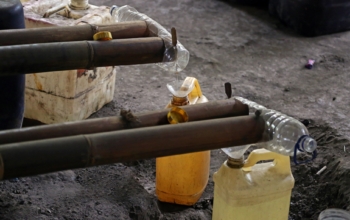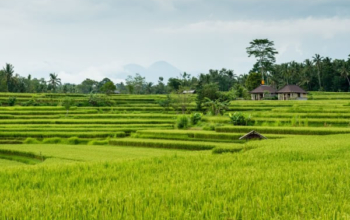The Art of Sopi: Discovering the Traditional Alcoholic Beverage of Aimere
10 Januari 2025 549x Nature
Introduction to Sopi
Sopi is a traditional alcoholic beverage deeply ingrained in the cultural fabric of Aimere, a region known for its rich heritage and vibrant customs. This alcoholic drink, primarily made from fermented palm sap, has been a significant part of local ceremonies, festivals, and social gatherings for generations. The process of Sopi-making is not only a craft but also a cherished tradition that embodies the spirit of community and celebration in Aimere.



The purpose of this blog post is to explore the fascinating world of Sopi, offering readers a comprehensive insight into its significance, preparation methods, and the cultural practices surrounding its consumption. Sopi acts as a symbol of hospitality and social cohesion among the people of Aimere. As we delve into the intricacies of Sopi-making, we will highlight how this beverage plays a crucial role in various communal activities, binding the community together through shared experiences.
The Sopi-making process is an intricate art form that requires skill and knowledge passed down through generations. This post aims to demystify that process, discussing the essential ingredients, fermentation methods, and the artistry involved in producing this beloved drink. We will also touch upon the diverse varieties of Sopi that exist across Aimere, each with its unique flavor profiles and cultural connotations. Understanding these aspects not only enriches one’s appreciation of Sopi but also underscores the importance of preserving such traditions in an ever-evolving world.
In the subsequent sections, we will further investigate the historical context of Sopi, its production techniques, and its role in contemporary social dynamics, providing a comprehensive understanding of this remarkable beverage that continues to be celebrated in Aimere.
Cultural Importance of Sopi in Aimere
Sopi, the traditional alcoholic beverage of Aimere, holds significant historical and cultural value within the community. Its origins can be traced back to the indigenous practices of the region, where the beverage was initially created for ceremonial purposes. Sopi is more than just a drink; it embodies the essence of Aimere’s heritage, symbolizing communal identity and continuity of traditions. Celebratory rituals, particularly those related to agricultural harvests and community milestones, prominently feature Sopi, reinforcing its role as a vital cultural artifact.
During local ceremonies, Sopi is often shared among families and friends, fostering a sense of unity and belonging. The act of drinking Sopi transcends mere consumption; it becomes a ritual that strengthens interpersonal bonds and cultivates community spirit. In gatherings, it is customary for elders to be the first to partake in Sopi, showcasing respect and honoring tradition. This is particularly evident during festivals, where music, dance, and storytelling accompany the sharing of Sopi, enveloping the event in a lively and joyful atmosphere.
Moreover, Sopi serves as a conduit for oral traditions, as stories and memories associated with the beverage are shared alongside it. Through these narratives, the values and customs of Aimere are passed down from generation to generation, ensuring the preservation of cultural identities. The beverage is also utilized in various other contexts, such as welcoming guests, where offering Sopi signifies hospitality and goodwill.
In conclusion, the cultural importance of Sopi in Aimere cannot be overstated. It is an integral part of social gatherings and serves a crucial role in the community’s traditions and celebrations, making it much more than a drink; it is a vessel of heritage and communal ties that enriches the social fabric of Aimere.
Ingredients: What Goes Into Making Sopi
To truly appreciate the intricacies of Sopi, one must first explore the essential ingredients that contribute to this traditional alcoholic beverage. The primary base for Sopi typically consists of the fermented fruits and grains prominent in the region. In many cases, the process begins with locally sourced fruits such as cassava, bananas, or maize, which are integral to the Sopi’s distinct flavor profile. These ingredients are not merely selected for their availability; they hold cultural significance and are deeply rooted in the local agricultural practices of Aimere.
Moreover, the fermentation process is often enhanced by the inclusion of indigenous herbs and spices, which not only add depth to the flavor but also reflect the unique traditions of the community. Ingredients such as cloves, cinnamon, or ginger find their way into the brewing phase, imparting aromatic qualities and enriching the overall sensory experience of Sopi. The use of these natural botanicals underscores the importance of traditional knowledge in crafting this beverage, as locals have perfected their recipes over generations.
The sustainability of Sopi production also hinges on the utilization of locally grown materials. This practice fosters a sense of community and promotes the economic stability of the region. By sourcing ingredients from local farmers, the production of Sopi not only supports traditional indigenous methods but also minimizes environmental impact through reduced transportation costs. As a result, the beverage becomes a celebratory symbol of both cultural heritage and ecological responsibility.
An understanding of these key ingredients highlights the commitment to tradition and sustainability inherent in Sopi production. With the careful selection of fruits, grains, herbs, and spices, this cherished drink encapsulates the essence of Aimere’s rich cultural landscape.
The Traditional Process of Making Sopi
The creation of Sopi, the cherished alcoholic beverage from Aimere, involves a meticulous process that reflects the cultural heritage of the region. This traditional method entails several key phases: harvesting, fermentation, and distillation. Each step is vital in producing the distinctive flavor profile that Sopi is known for.
The journey of Sopi begins with the careful selection of raw materials, primarily the fermented sap of the palm tree. The local producers usually gather this sap in the early mornings to ensure its freshness and quality. This sap, often referred to as ‘tapping,’ is collected from the flowering buds of the palm tree, which is a labor-intensive process. Skilled sap-tappers utilize specific tools to extract the sweet liquid without damaging the tree, ensuring sustainability for future harvests.
Once harvested, the sap undergoes a natural fermentation process. This process typically lasts from a few hours to a couple of days, depending on environmental conditions such as humidity and temperature. During fermentation, wild yeasts present in the environment interact with the sugars in the sap, resulting in alcohol production. This stage is crucial as it determines the initial flavor and aroma characteristics of the Sopi, significantly influencing its quality.
Following fermentation, the next step involves distillation, which is where the craft of Sopi production truly shines. The locally crafted stills, often made from traditional materials, are heated to extract the alcohol from the fermented sap. Distillation not only increases the alcohol content but also helps in enhancing the unique flavors of Sopi. The distillation process is carefully monitored, and skilled producers can capture the ‘heart’ of the distillate—this is the portion that possesses the optimal balance of flavors.
In essence, the traditional process of making Sopi reflects the deep-rooted practices of the Aimere community. Each phase contributes significantly to the final product, ensuring that the beverage maintains its cultural significance and unique taste. Understanding this process provides valuable insights into the artistry involved in crafting Sopi.
Tools and Equipment: Crafting Sopi
The traditional alcoholic beverage known as Sopi is deeply rooted in the cultural heritage of Aimere, and its production process relies on a variety of specialized tools and equipment. These instruments are not only functional but also reflect the craftsmanship and heritage of the community. One of the primary tools used in the crafting of Sopi is the traditional still, known locally as “alambik.” This device, typically fashioned from copper, is crucial for the distillation process. The still consists of a boiler where the fermented material is heated, allowing the alcohol vapors to escape and condense into liquid form. The craftsmanship involved in creating a high-quality still is a testament to the skill of the local artisans.
In addition to the still, the fermentation process requires a fermentation vessel, often made from clay or wood. These vessels are intentionally chosen for their ability to maintain the ideal environment for yeast activity, ensuring that fermentation occurs effectively. Handcrafted containers uphold the traditions of Aimere, as many local producers value the use of traditional materials that have been passed down through generations. The size and shape of these vessels can significantly influence the flavors and characteristics of the final Sopi product.
Another essential piece of equipment is the straining device, which is employed to separate the liquid from the solid materials after fermentation. In Aimere, this is typically achieved using a manual cloth or sieve. This handmade approach reflects the community’s commitment to preserving traditional methods, emphasizing the importance of human touch in the production of Sopi.
Furthermore, the use of measuring tools, such as handcrafted wooden spoons and jugs, ensures precision during the various stages of crafting Sopi. Each instrument not only contributes to the overall production process but also embodies a rich cultural narrative, illustrating the intricate balance between tradition and craftsmanship in the art of Sopi.
Tasting Sopi: Flavors and Pairings
Sopi, a traditional alcoholic beverage from the Aimere region, offers a complex and fascinating flavor profile that reflects its rich cultural heritage. Primarily derived from fermented cassava and coconut sap, Sopi presents a variety of taste notes that range from sweet to slightly sour, embodying the essence of local ingredients and traditional brewing techniques. The fermentation process contributes to a distinctively earthy aroma, accented by hints of tropical fruits, vanilla, and perhaps even a touch of spice. This unique combination can lead to variations of Sopi that are influenced by the methods and ingredients utilized by different brewers.
There are several well-known variations of Sopi, each presenting its own twist on the foundational recipe. For instance, some brewers may add additional flavorings such as ginger or lemongrass, resulting in a more aromatic and zesty drink. Alternatively, others might introduce different fruits during the fermentation process, leading to a sweeter, fruitier Sopi that appeals to a wider range of palates. Each version tells a story, creating a personal connection to the local culture and tradition of Aimere.
When it comes to food pairings, Sopi shines brightest alongside traditional Aimere dishes. The natural sweetness and acidity of Sopi complement richly flavored meals like grilled fish, skewered meats, and spicy vegetable dishes, making it an ideal companion for a variety of culinary experiences. Additionally, lighter fare such as tropical fruit salads and coconut-based desserts can also enhance the flavors of Sopi, showcasing its versatility. Enjoying Sopi is as much about the taste experience as it is about the social connection it fosters, making it a cherished beverage in both communal and celebratory contexts.
Modern Adaptations of Sopi
Sopi, the traditional alcoholic beverage of Aimere, has witnessed significant transformations over the years. Its production methods, deeply rooted in heritage, continue to be influenced by modern techniques and innovations aimed at improving quality and efficiency. While the time-honored methods of fermentation and distillation remain integral to Sopi’s production, modern adaptations are beginning to emerge, reflecting both technological advancements and changing consumer preferences.
Many producers are now incorporating contemporary equipment that enhances the brewing process. For instance, the introduction of advanced fermentation tanks enables better temperature control and precise monitoring, which can significantly improve the flavor profile of the final product. Additionally, the use of digital tools to track the fermentation process represents a shift towards more scientifically-informed production methods. While these innovations are becoming prevalent, many traditionalists continue to emphasize the importance of manual techniques, arguing that these time-tested practices contribute to the authentic taste of Sopi.
The influence of younger generations is also a notable factor in the evolution of Sopi. As the younger population becomes increasingly involved in production, they bring new ideas and perspectives that challenge conventional practices. This age group tends to prioritize sustainability and health, prompting some Sopi makers to experiment with organic ingredients and low-alcohol options, thus broadening the beverage’s appeal. Young entrepreneurs are not only preserving the essence of Sopi but are also adapting it for modern contexts, ensuring its relevance in today’s market.
Ultimately, the balance between tradition and innovation will shape the future of Sopi. It will be interesting to see how these modern adaptations will play a role in maintaining the cultural significance of Sopi while simultaneously appealing to a broader demographic. As the beverage continues to evolve, it will undoubtedly remain a vital symbol of Aimere’s heritage.
Sopi in Aimere Today: Community and Economy
The traditional alcoholic beverage known as Sopi plays a significant role in the contemporary economy of Aimere, a region that has long celebrated its cultural heritage through this unique drink. Sopi is crafted primarily from the indigenous sap of the sago palm and reflects the agricultural richness of the area. Today, local producers have adapted their marketing strategies to cultivate a broader audience, both locally and internationally. They emphasize the organic and sustainable practices involved in Sopi production, which appeals to the growing market for artisanal and ethically sourced beverages.
Moreover, the marketing of Sopi extends beyond mere sales; it enhances the visibility of Aimere’s cultural identity. Festivals celebrating Sopi not only promote the beverage but also attract tourists, thus fostering economic growth through increased foot traffic to local markets and restaurants. These events often showcase the traditional methods of Sopi production, allowing visitors to engage directly with the community and experience the rich cultural narratives surrounding the drink.
The impact of Sopi on tourism in Aimere cannot be overstated. As travelers seek authentic experiences, they are drawn to the stories and traditions encapsulated in each bottle of Sopi. Local businesses often see a significant boost during festive seasons when Sopi is in high demand, thereby providing a vital income stream for community members. Furthermore, the sales generated from local production ripple through the economy, supporting farmers, artisans, and service providers. The interdependence created by the Sopi industry solidifies its role in the livelihood of Aimere’s residents.
In conclusion, Sopi embodies more than a beverage; it serves as a cornerstone of Aimere’s economy and cultural identity. Its promotion through various channels enhances both community coherence and economic stability, ensuring that this traditional drink remains a significant aspect of daily life in Aimere.
Conclusion: Celebrating Sopi and Its Legacy
Sopi, the traditional alcoholic beverage of Aimere, stands as a profound emblem of cultural heritage, encapsulating the identity, social practices, and agricultural traditions of the region. Throughout this exploration, we have delved into the intricate process of Sopi production, from the selection of authentic ingredients to the meticulous fermentation techniques employed by local craftsmen. This traditional drink is not merely a beverage; it embodies the communal spirit of Aimere, fostering social gatherings and celebrations that bring people together.
The significance of Sopi extends beyond its taste; it serves as a symbol of resilience and adaptation. As societal norms and preferences evolve, the traditional methods of Sopi-making are being safeguarded and revived, highlighting the importance of preserving local customs amid globalization. This resurgence reflects a broader appreciation for artisanal practices and sustainable consumption, encouraging both locals and visitors to engage with and cherish their culinary roots.
Encouraging readers to appreciate the essence of Sopi involves more than mere acknowledgment; it invites an experience. Participating in local festivals or workshops provides an immersive insight into this fascinating beverage’s cultural backdrop, enabling individuals to connect with Aimere’s rich traditions. Sampling Sopi, with its distinct flavor and aroma, can enhance the understanding of how this traditional drink embodies the spirit of a community.
As we celebrate Sopi, let us recognize its importance not just as a drink but as a cherished legacy. By embracing Sopi and its cultural significance, we contribute to the preservation and appreciation of Aimere’s rich heritage for future generations. This journey into the heart of Sopi is a reminder of the power of traditional practices in bringing communities together and enriching our collective cultural tapestry.
Maybe you are interested in reading the following article:

The Art of Sopi: Discovering the Traditional Alcoholic Beverage of Aimere
Introduction to Sopi Sopi is a traditional alcoholic beverage deeply ingrained in the cultural fabric of Aimere, a region known for its rich heritage and vibrant customs. This alcoholic drink, primarily made from fermented palm sap, has been a significant part of local ceremonies, festivals, and social gatherings for generations. The process of Sopi-making i... read more

Exploring Kelimutu National Park: An Exciting Flores Overland Tour
Explore the breathtaking landscapes and rich culture of Flores Island and Kelimutu National Park in Indonesia. Discover the stunning tri-colored crater lakes, immerse yourself in local customs, and plan your overland tour for an unforgettable adventure. Engage with the vibrant communities, enjoy thrilling hikes, and learn about the significance of the lakes ... read more
Contact Us
If you have any questions, please contact us.
-
Hotline
+6285212194809 -
Whatsapp
085212194809 -
Email
admin@kawanflores.com






No comment yet